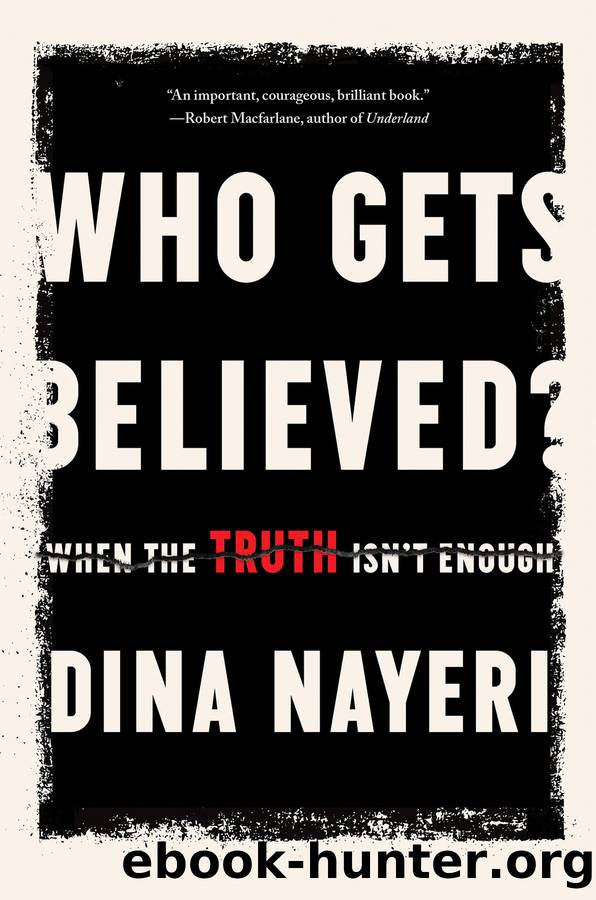Who Gets Believed? by Dina Nayeri;

Author:Dina Nayeri;
Language: eng
Format: epub
Publisher: Penguin Random House LLC (Publisher Services)
Published: 2022-12-19T00:00:00+00:00
In our forties now, Adam and I laugh about our college days over Zoom. I tell him about my prenatal theater, Joshâs struggle to see a doctor. He tells me about the ER minefield. People come in for all kinds of secondary reasons, besides the apparent emergency: a dose of painkiller, narcotics for a party, a doctorâs note. Frequent fliers know every nurse, doctor, and PA by name. Some are homeless, desperate to escape the cold, to be fed; they come in with a new ailment daily. A jaded fifth-year intern will say, âOh thatâs just Lenny. Give him his sandwich and send him along.â To that, Adam says, âLet me tell you about the day the last ten Lennys died.â There is always the day when the frequent flier dies. When the true warning signs come, the frequent flier knows just where to go. But after all those turkey sandwiches, he is rarely believed. Itâs a classic wolf cry. At the end of the story, Adam reminds his interns, the wolf always comes.
Adam tells me about a sweet lady, partially blind, who came in once a week. âEvery doctorâs seen her fifty times. ER doctors are cynical schmucks. We knew ninety-nine percent of her visits were for nothing. But you donât want to miss the one time itâs something. Clown shoes . . . â He glanced down at his hands. âWe knew her,â he says, âand one day she died.â
Who is hardest to believe, I ask Adam, and who does most of the disbelieving?
Of countless medical biases heâs seen, Adam describes three notable ones: the Google bias (used to dismiss teens and the elderly), the poverty bias (used disproportionately against poor people of color), and the you-should-be-healthy bias (a quick way to disbelieve women).
âTwo weeks ago,â Adam tells me, âa precocious fourteen-year-old comes in with appendicitis.â The boy arrived in urgent care vomiting, with extreme belly pain. He told the nurse, I have appendicitis, explaining that the pain began in his umbilicus (he used that word), then moved to his right hip, and that, in the car, the road bumps gave him sharp aches. âA first-year med student knows this is a textbook presentation of appendicitis.â The nurse chuckled. âThe patientâs been googling!â She told him it was probably gastroenteritis and gave him food and drink, delaying his surgery by three hours. Eventually, the boy ended up in the ER, but the appendix might have burst while he was waiting for surgery, and because of his full stomach, he might have vomited, aspirated, and ended up on a ventilator in the ICU for a month.
The more seasoned the medical professional, Iâve noticed, the less frequent their eye-rolling over patients who research. Maybe because that knowledge isnât threatening; they donât need to distinguish their medical degree from Google results. âBut nurse practitioners donât have even ten percent of a physicianâs training,â says Adam. âThey donât know what they donât know.â The most effective mid-levels understand that and guard for blind spots.
Download
This site does not store any files on its server. We only index and link to content provided by other sites. Please contact the content providers to delete copyright contents if any and email us, we'll remove relevant links or contents immediately.
The Secret History by Donna Tartt(19092)
The Social Justice Warrior Handbook by Lisa De Pasquale(12190)
Thirteen Reasons Why by Jay Asher(8912)
This Is How You Lose Her by Junot Diaz(6887)
Weapons of Math Destruction by Cathy O'Neil(6281)
Zero to One by Peter Thiel(5802)
Beartown by Fredrik Backman(5756)
The Myth of the Strong Leader by Archie Brown(5508)
The Fire Next Time by James Baldwin(5447)
How Democracies Die by Steven Levitsky & Daniel Ziblatt(5219)
Promise Me, Dad by Joe Biden(5154)
Stone's Rules by Roger Stone(5088)
A Higher Loyalty: Truth, Lies, and Leadership by James Comey(4964)
100 Deadly Skills by Clint Emerson(4926)
Rise and Kill First by Ronen Bergman(4790)
Secrecy World by Jake Bernstein(4753)
The David Icke Guide to the Global Conspiracy (and how to end it) by David Icke(4720)
The Farm by Tom Rob Smith(4514)
The Doomsday Machine by Daniel Ellsberg(4490)
